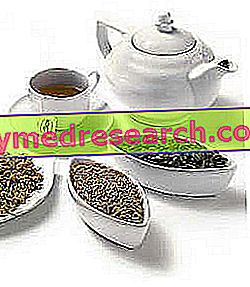
As is well known, herbal tea is a "gentle" method of therapy, which helps to alleviate the symptoms of certain diseases without wanting to replace synthetic drug therapy.

Being very common plants, considering the possible cases of allergies or cross-reactivity, poly-allergic subjects should always contact the doctor; the same is true for pregnant women, as some extracts are characterized by a marked stimulating activity.
Herbal tea 1 against cough
- Drosera, Drosera rotundifolia 1g (herbaceous parts)
1g of plant for a cup of boiling water: infuse for 5 minutes and drink 2-3 cups a day.
The sundew is a small carnivorous plant that contains among its active ingredients - in addition to enzymes, essential oils and flavonolic glycosides - the plumbagone (naphthoquinone derivative with antitussive and spasmolytic action).
It is a well tolerated plant; attention, however, in cases of established hypersensitivity or in subjects with gastric pathologies such as dyspepsia, gastritis and stomach acid.
Herbal tea 2 against cough
- Grindelia, Grindelia robusta, 2g (herbaceous parts).
Put 2g of drug in 150 ml of very hot water, leave to infuse for 5-10 minutes and drink up to 3 glasses a day.
Grindelia contains resins, essential oil, flavonol derivatives and triterpene saponins (these last ones confer the anti-cough activity on the herbal tea): it acts as an expectorant and spasmolytic, useful when the respiratory tract is inflamed and produces an excessive amount of mucus.
Grindelia is a safe plant and should be avoided only in case of proven hypersensitivity.
Herbal tea 3 (emollient) against cough
- Common flax, Linum usitatissimum, 40g (seeds);
- Chamomile, Matricaria camomilla, 20g (flowering tops);
- Altea, Althaea officinalis, 20g (leaves);
- Mallow, Malva sylvestris, 20g (leaves).
Prepare an infusion and drink a cup up to 3 times a day, possibly sweetening with honey instead of common sugar.
In this infusion all the species have a marked emollient activity, useful in the case of catarrhal coughs where the act of coughing causes strong irritation of the mucous membranes.
Apart from the chamomile, which due to the presence of sesquiterpene lactones could give rise to allergic reactions, in general the species present do not create problems.
As always, be sure to avoid allergies.
Herbal tea 4 (emollient) against cough
- Mullein, Verbascum thapsus, 30g (flowers);
- Farfara, Tussilago farfara, 20g (flowers);
- Hyssop, Hyssopus officinalis, 25g (flowers);
- Wild Thyme, Thymus serpyllum, 10g (flowers);
- Mallow, Malva sylvestris, 15g (flowers).
Prepare an infusion, drink a cup 2-3 times a day between meals, sweetening with honey.
Herbal tea is contraindicated in pregnant women and children due to the presence of coltsfoot.
The coltsfoot contains in a minimum quantity pyrrolidinized hepatotoxic, genotoxic and carcinogenic alkaloids, but it can be safely used in herbal tea for the anti-inflammatory treatment of pathologies affecting the upper airways; in this regard, however, it is important not to exceed 6 weeks of use within a year.
Herbal tea 5 against cough
- Farfara, Tussilago farfara, 35g (flowers);
- Mullein, Verbascum thapsus, 30g (flowers);
- Altea, Althaea officinalis, 20g (leaves);
- Wild thyme, Thymus serpyllum, 15g (flowers).
Prepare an infusion and drink up to 3 cups a day.
Excellent emollient and bechic remedy (cough sedative).
Herbal tea is contraindicated in pregnant women and children due to the presence of coltsfoot.
Herbal tea 6 against cough
- Licorice, Glycyrrhyza glabra, 20g (root);
- Farfara, Tussilago farfara, 20g (flowers);
- Mallow, Malva sylvestris, 20g (flowers);
- Wild Thyme, Thymus serpyllum, 20g (flowers);
- Anise, Pimpinella anisum, 20g (fruits or seeds).
Prepare an infusion and drink up to 3 cups a day.
The presence of licorice, a plant rich in saponins, emphasizes the use of the preparation for an emollient purpose, but above all an expectorant.
Herbal tea is contraindicated in pregnant women and children due to the presence of coltsfoot.
Attention in subjects with problems of gastritis and ulcer, given the presence of anise, which could also induce photosensitivity in predisposed subjects.



